Farmers Weekly Awards: Young Farmer finalists 2021
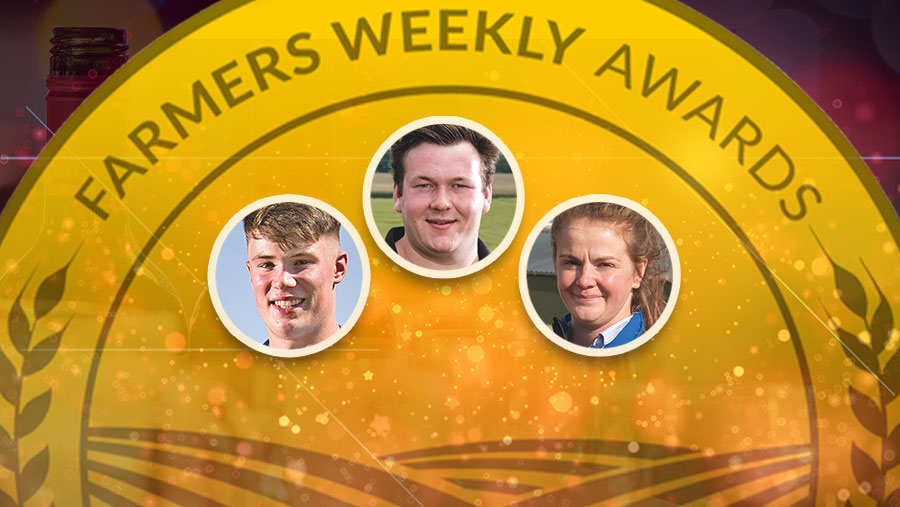
This year’s three finalists have overcome significant challenges both as individuals and as team members.
Their love for agriculture and pride in the industry stands them in good stead for the future.
See also: Farmers Weekly Awards: 2021 finalists
The finalists:
- Benjamin Clappison
Cowlam Grange, East Yorkshire - Dafydd Edwards
Groesasgwrn, Carmarthenshire - Harriet Ross
Newseat of Dumbreck Farmhouse, Aberdeenshire
The judging team visited each of the finalists for a three-hour interview and farm tour.
The judges:
- Bertie Newman
2020 Young Farmer of the Year - Cath Crowther
CLA East regional director - Lauren Harris
Farmers Weekly deputy business editor
Benjamin Clappison
Cowlam Grange, East Yorkshire
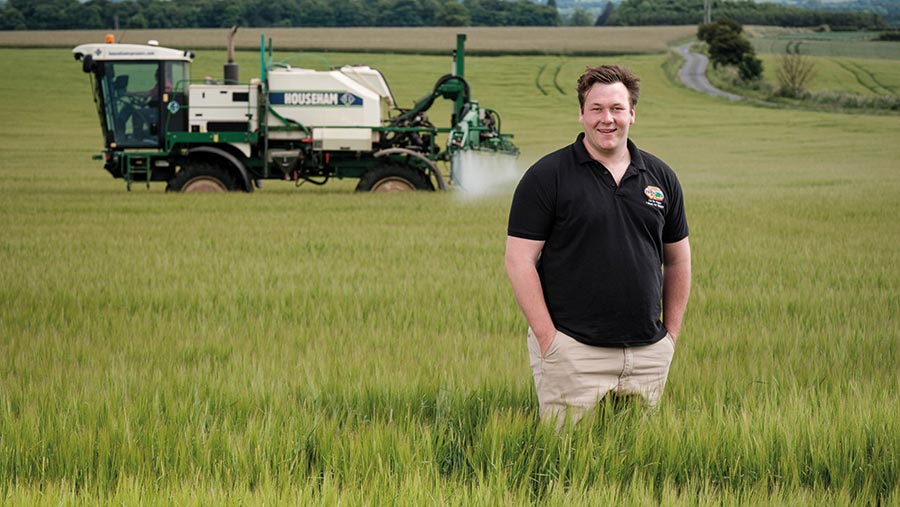
Benjamin Clappison, Farmers Weekly Awards 2021 Young Farmer of the Year finalist © Jim Varney
Benjamin Clappison farms with his parents on an Agricultural Holdings Act tenancy near Driffield.
His father Philip – Farmers Weekly Contractor of the Year in 2013 – took on the holding when he was 18 years old, following the death of Benjamin’s grandfather.
Philip used a bank loan to buy a potato harvester and proceeded to build up a highly successful contracting business.
“He’s a great example for me,” said Benjamin. “We hear a lot about people not wanting to put the hours in, but I have got a role model of someone who has come from nothing and worked really hard to get where they are.”
Farm facts
- Agricultural Holdings Act tenancy
- Employed worker in parents’ business TB Clappison, and partner alongside parents in Cowlam Grange Partnership
- Arable, contracting, potatoes
- Manages groundwork for the Ministry of Defence’s RAF bases
- Share-farming and contract-farming agreements with neighbours
- Entry Level stewardship scheme
Getting started
Having grown up on the farm, he counts himself lucky to have learned so much from his father and the contracting business, seeing many different farmers, soils and enterprises first-hand.
“Looking back, I realise how fortunate I was to gain so much experience in such a short period of time,” Benjamin said.
“I came to understand I have a passion for farming, not just because it’s what I’ve grown up with, but because it’s what I want to do.”
He went on to complete a degree at the Royal Agricultural University, which included a 20-week placement at Grimme UK and Ireland working as a service engineer.
After university, Ben spent a few months travelling in Australia, working as a mechanic on a 20,000ha unit and managing four 10.90 New Holland combines, and then returned to the family business with ideas on what to improve.
Current business
The business grows wheat, second wheat, spring and winter barley, peas and potatoes.
For the contracting work, Benjamin has pushed to produce field maps for customers, which he says looks more professional, gets the clients more involved and helps them buy into the work.
“I’m taking on more responsibility and I’m doing more of the decision making as well,” he said.
“I make a lot of decisions about land work, especially in the spring in terms of what the land needs for cultivation, and precision farming. I also teach staff how to drive the tractors and the combines if necessary.”
With the potato sector increasingly under pressure, he has tried to find different opportunities to spread the risk, and two years ago began working with the Ministry of Defence, a project he has led on.
Benjamin and his team take on jobs on RAF bases such as creating runways, and spraying and cutting grass, which is then sold on to local farmers, either loose or baled.
Most of Cowlam Grange’s machinery is serviced in-house, and the team have used those skills to service and rebuild the MOD’s lawnmowers and other equipment.
Going forward
If given the opportunity, Benjamin would like to buy the farm and stay long term.
Within the business, he aims to grow every part gradually to ensure it’s sustainable, invest in new equipment such as optical sorters for potatoes, and look at different cropping methods, min-till and direct drilling.
He has considered hydroponics and vertical farming as options for the future, and would be interested in trials for gene modified crops, such as bruise- and blight-resistant potatoes.
As Benjamin is one of the youngest staff members at the farm, he is keen to recruit some younger workers, and is interested in hosting apprentices and placement students.
“The margin for farming now is so tight, it’s a hard business to be in and it will only get harder without BPS,” he said.
“But I don’t think losing BPS will really affect us because we have diversified from normal farming.”
What the judges say
Benjamin has shown great interest in both the family farming business and seeking additional income streams. He is passionate about the sector, public engagement and improving agriculture’s reputation.
The judges liked
- Engages public in farming with Facebook page and drone videos
- Enthusiastic and passionate about farming
- Interested in improvements, new technology and finding new business/markets
- Keen on travelling and learning: worked as farm mechanic in Australia and is considering Nuffield Scholarship
- Recognises importance of looking after current clients and standing out from competitors
In numbers
- 24 years old
- 89ha on AHA tenancy
- 10 staff minimum
- 25 staff during busy periods
- 1,942ha managed for MOD this year
Dafydd Edwards
Groesasgwrn, Carmarthenshire
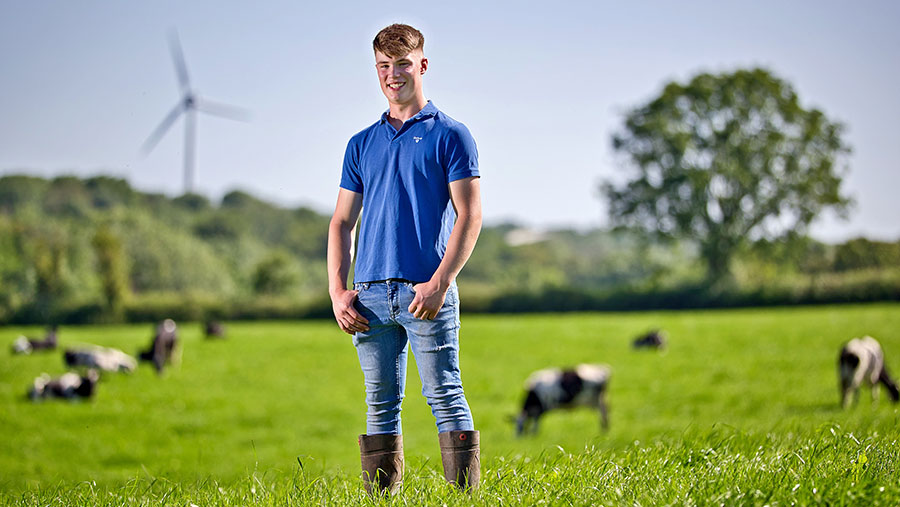
Dafydd Edwards, Farmers Weekly Awards 2021 Young Farmer of the Year finalist © Richard Stanton
Third-generation dairy farmer Dafydd Edwards grew up on the family holding near Kidwelly and developed a love of agriculture.
His grandfather bought 120ha Groesasgwrn in 1998 and transitioned it into a dairy unit.
The business also rents 60ha across two farms on short-term rolling agreements, and splits the land across stock and silage.
Farm facts
- Works on family dairy farm
- Started own fencing business three years ago
- Bought and manages own flock as cash crop
- Does own AI and foot trimming
- In charge of Cattle Information Service records
Getting started
The oldest of four sons, Dafydd has naturally taken on a leadership role as he has grown up.
Starting off feeding calves, during his teenage years he moved on to milking, working in the parlour, driving tractors and machinery, and helping select bulls.
He studied agriculture at Gelli Aur Agricultural College for two years before returning to the family farm.
Since then, Dafydd has taken responsibility for many of the daily chores and general jobs such as calving, dehorning and castrating.
Current business
The family has about 160 milking cows and recently invested in some pedigree Holstein Friesians, which Dafydd said was a big move.
He looks after the Cattle Identification Service records for the business and uses the tool for benchmarking.
Dafydd does the farm’s foot trimming and, alongside his father, the herd’s artificial insemination.
They bring in a contractor for silage, handing off the labour-intensive work to allow them to focus on the cows.
Last year, Dafydd bought 200 store lambs for fattening and slaughter, managing to make a profit. He also bought 70 ewes this year, which he lambed himself.
Three years ago, he started his own fencing business, recruiting customers from local farmers and growing the enterprise through word of mouth and reputation.
“I bought my own post knocker and used my dad’s tractor at first, but then I saved up and bought my own second-hand tractor outright,” Dafydd said.
“The main push is in the spring but it can be year-round if people want it. I wanted the extra income but still to be flexible and be able to be at home if I want or need to.”
Going forward
Looking ahead, Dafydd would like to move to autumn calving and focus it to a smaller block – about 12 weeks – which he says makes sense for the business and would allow him to otherwise concentrate on ground maintenance and getting grass ready for silaging.
One option to work on is selling milk direct, which would mean more paperwork and take more time but seems likely to achieve a better price than the current contract with Glanbia.
He had considered pasteurising their own milk and selling it on farm, but decided the running costs and potential lack of footfall rendered this a difficult proposition.
Dafydd bought a sheepdog last autumn and is planning to get into trialling soon.
He is also keen on completing some more Farming Connect courses to improve his knowledge, particularly on feed and nutrition, and dry cow management.
Meanwhile, he is likely to continue with the sheep enterprise and he hopes it will help mitigate the loss of BPS income.
Dafydd feels the business is ahead of the game with Wales’ upcoming nitrate vulnerable zone (NVZ) mandate, having already extended the slurry storage and with plans to put up more heifer sheds.
“The new rules will be a bit of a push but we are keeping that in mind with our building plans,” he said.
“We speak openly here about our plans and I would like to run my own farm one day, with a larger herd of pedigree Holstein Friesians.”
What the judges say
Dafydd clearly loves farming and is keen to improve his already impressive experience and knowledge. He is willing to try new things and is on top of farm policy and environmental ideas.
The judges liked
- Taken on responsibility from a young age
- Involved in decision making and in charge of a lot of daily tasks and general jobs
- Problem solver and mature beyond his years
- Interested in and has knowledge of farming and wider industry
- Confident, logical, passionate about agriculture and interested in learning more
In numbers
- 20 years old
- 120ha owned
- 60ha rented
- 160 dairy cows
- 270 sheep total bought, bred and sold last year
Harriet Ross
Newseat of Dumbreck Farmhouse, Aberdeenshire
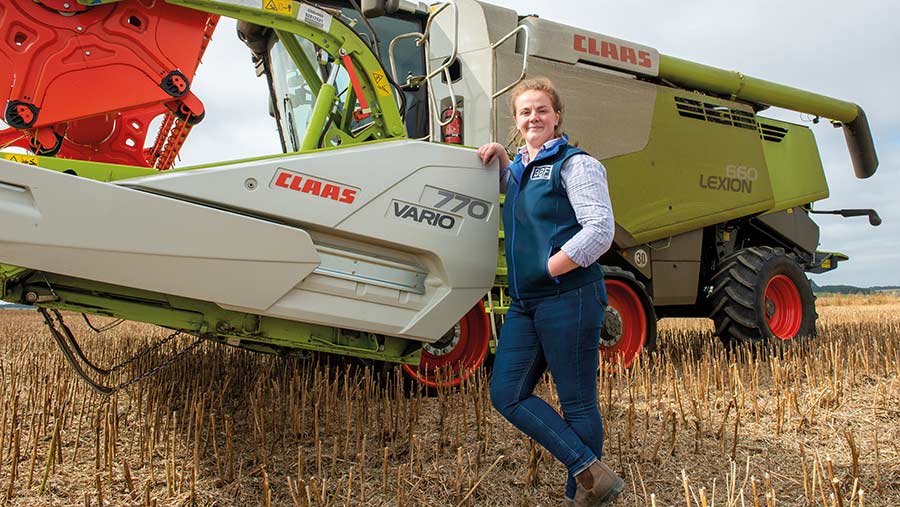
Harriet Ross, Farmers Weekly Awards 2021 Young Farmer of the Year finalist © Angus Findlay
Harriet Ross grew up on the family arable farm but wasn’t pushed down the farming route and instead studied geography at university.
After graduating, she spent several years working as a farming consultant, leaving the role in July.
Now, alongside partner Ben, she owns a successful pig farm, manages what used to be her parents’ arable enterprise, runs a livery diversification, and holds a 10-year tenancy.
Farm facts
- Recently bought pig farm
- Also manages parents’ former arable holding
- 10-year modern limited-duration tenancy with local trust
- Livery diversification
- Picks up contracting work to justify kit ownership
- Experience working as farming consultant
Getting started
While studying at university, Harriet set up a livery business at the family farm, realising the demand was there. She applied for a grant to convert a farm shed into an indoor school and also invested in a new stable block.
The business offers part- or full-time livery depending on the season, and makes use of the farm’s poorer land.
In 2019, Harriet and Ben successfully secured a three-year short limited-duration tenancy at the 158ha Newseat of Drumbreck, ahead of more than 40 applicants.
“We got shortlisted and had to speak to a judging panel of five people, and we got grilled,” Harriet said.
“We had letters from the bank and solicitors saying we could do it and they said our interview swung it.”
After two years, the couple were already thinking about the agreement coming to an end, and were wary of investing in the holding.
In negotiation with the landlord, the agreement was extended for a further seven years.
So far it has been run predominantly as an arable unit, with 2,400 B&B pigs.
This year, Harriet and Ben also fully took over her parents’ farming business, covering 235ha of mainly arable land with crops including wheat, oilseed rape, oats and barley.
Current business
In August, the pair bought a neighbouring pig farm, taking on 460 sows and six staff, and stopped the B&B enterprise for biosecurity reasons.
They had been contracting for the owner and after harvest 2020 asked if he would consider a joint venture. Instead, in February 2021 he offered them the chance to buy it.
“We had to go away and see if we could do it and then approach every bank and try to justify it,” Harriet said.
“I think the bank was OK with it in the end because we had also taken all of the pigs on.”
The more regular income from the pigs helps support the arable system, the manure is used instead of bagged fertiliser, and the land is used to grow food for the pigs, more than halving feed costs.
Going forward
“We need to find our feet with the pig farm first and then look to tweak it, but it’s a high-performing place so it will only be small tweaks,” Harriet said.
“We use our own boars and collect our own semen so our first decision will be whether to change to artificial insemination.”
She would like to improve her management skills, work on recording as much as possible, and improve efficiency.
Adding value, reducing antibiotics use and soya consumption, and working in harmony with the environment are key aims.
Harriet has already done a carbon audit for her arable enterprise and is interested to see how this can be developed with the addition of the pigs.
“We have learned a lot from other farmers and professionals in the Leaf [Linking Environment and Farming] resilience scheme,” she said.
“I want to do this job well for the next few years and then we’ll see what’s next.”
What the judges say
Harriet has shown great ambition and determination to get to where she is and manage multiple enterprises. Her intelligence and knowledge are clear to see through her logical decision making.
The judges liked
- Part of three-year Leaf resilience scheme working towards becoming a demo farm
- Thinking about sustainability, carbon footprint, renewables and progression
- Sensible move to combine arable enterprise with more consistent income from pigs
- Ambitious, independent, hardworking and knowledgeable
- Conscious of costings, business plans and cashflow
- Interested in public engagement, future farm policy, benchmarking and learning from others
In numbers
- 29 years old
- 485ha farming in total
- 6 full-time staff
- 9,000 pigs at any one time
- 300 piglets born a week
Sponsor quote
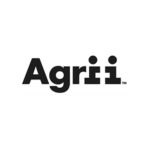
“With an evolving agricultural landscape, there has never been a more exciting time to be a young farmer. The clear enthusiasm of the three finalists will help to lead the way to a sustainable and innovative farming future.”
Amy Watkins, Agrii sustainability project manager
